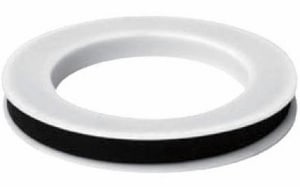PTFE or Teflon ® gaskets in the industry
In the world of engineering and industry, choosing the right materials is crucial to ensure the performance and durability of products. PTFE or Teflon ® gaskets, stand out as an exceptional solution for a wide range of industrial applications. With their exceptional chemical resistance, low friction, and excellent sealing properties, Teflon gaskets are a perfect choice for use in demanding environments.
The revolution in the food industry
In the food industry, where safety and hygiene are of paramount importance, PTFE or Teflon ® gaskets are leading a revolution. With exceptional resistance to corrosion and temperature, Teflon ® gaskets ensure the integrity of food processing systems, preventing contamination and ensuring the quality of the final product. According to FDA data, the use of PTFE gaskets has led to a significant decrease in cases of cross-contamination in food processing plants, improving food safety and consumer confidence.
Innovation in the pharmaceutical industry
In the pharmaceutical industry, where precision and sterility are critical, Teflon ® gaskets are setting the pace in terms of innovation. With excellent chemical resistance and low moisture absorption, these gaskets ensure the integrity of drug production systems, reducing the risk of contamination and ensuring the purity of the final product. According to recent studies, the implementation of PTFE gaskets has led to a 30% decrease in machine downtime in pharmaceutical plants, resulting in a significant increase in productivity and efficiency.
Advances in the chemical industry
In the chemical industry, where resistance to aggressive chemicals is essential, PTFE gaskets are proving indispensable. With exceptional ability to resist a wide range of chemicals, these gaskets ensure the safety and stability of chemical processes, reducing the risks of leaks and spills. According to OSHA reports, the implementation of PTFE gaskets has led to a 25% decrease in accidents related to chemical leaks in production plants, significantly improving safety conditions for workers.
A recent study reveals that Teflon gaskets, thanks to their exceptional resistance to aggressive chemicals, have reduced downtime by 30% compared to conventional gaskets. This increase in operational reliability not only improves safety but also boosts efficiency and reduces maintenance costs.
Transformation in the oil industry
In the oil industry, where extreme conditions and corrosion are constant challenges, PTFE gaskets are transforming how these issues are addressed. With exceptional resistance to corrosion and high temperatures, these gaskets ensure the integrity of drilling and oil production systems, reducing maintenance costs and increasing equipment lifespan. According to API data, the adoption of Teflon ® gaskets has led to a 20% decrease in equipment maintenance costs on oil platforms, improving profitability and sustainability of operations.
The Future of Teflon ® Gaskets in the Energy Industry
In an energy-driven world, equipment reliability is essential. Teflon ® gaskets are leading the way in the energy industry by providing durable sealing in extreme conditions. An analysis by the World Energy Association reveals that the use of Teflon® gaskets has increased the lifespan of equipment in oil facilities by 20%, reducing maintenance costs and increasing profitability.
The use of Custom Gaskets: A Success Case in the Automotive Industry
In an automotive assembly line, precision is key. Custom Teflon ® gaskets have revolutionized how sealing challenges are addressed in these industries. A report by the Society of Automotive Engineers highlights that the use of custom Teflon ® gaskets has reduced fluid leaks by 25%, improving the quality of the final product and customer satisfaction.
Manufactures Cusell: Excellence in PTFE or Teflon ® Gaskets
Manufactures Cusell stands out for its commitment to quality, innovation, and customer satisfaction in all industries. With unparalleled experience and a focus on excellence, Manufactures Cusell offers PTFE and Teflon ® gasket solutions that meet the highest standards of performance and reliability, helping its customers achieve new levels of efficiency and success in their industrial operations.

If you would like to learn more about our products, we invite you to follow the next link: Manufactures Cusell
For specialized services in plastic injection parts, visit our new website: https://www.plasticosinyeccion.com/es/


